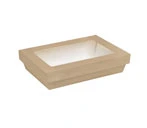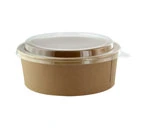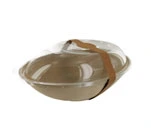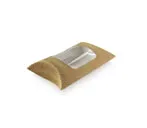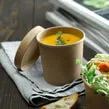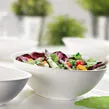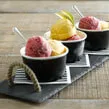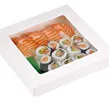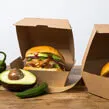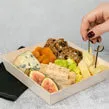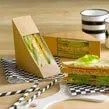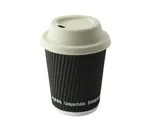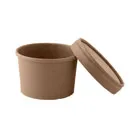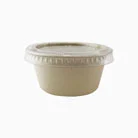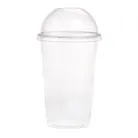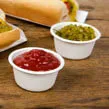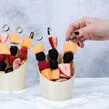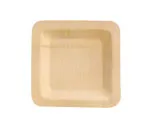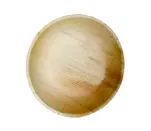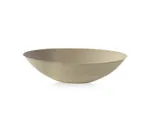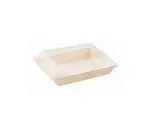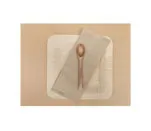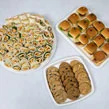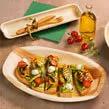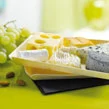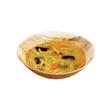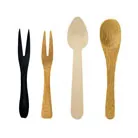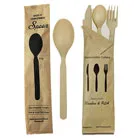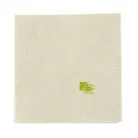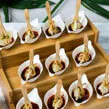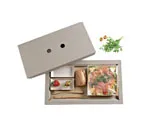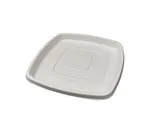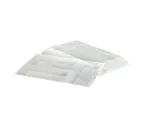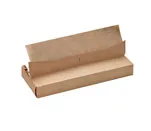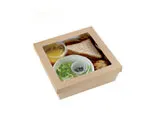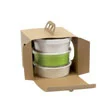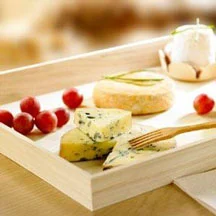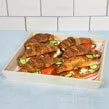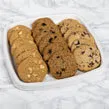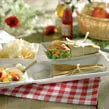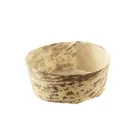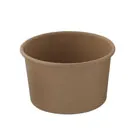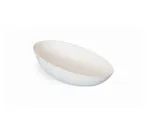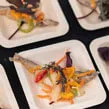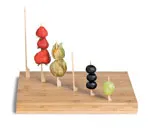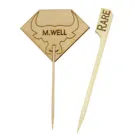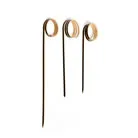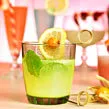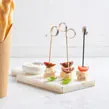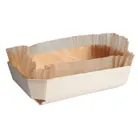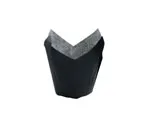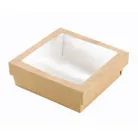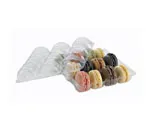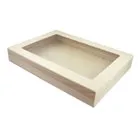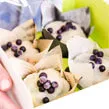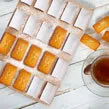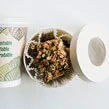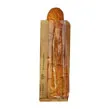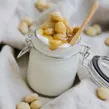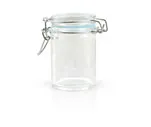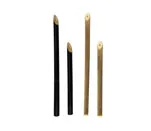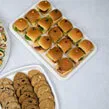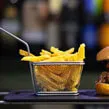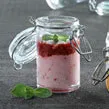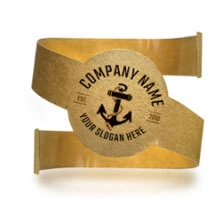Every meal should feel good—right down to the packaging! That’s why we create our disposable and reusable food service supplies using eco-friendly materials sourced straight from nature. Think of it as a feast for both your taste buds and the planet. From biodegradable wonders to reusable champions, our products are designed to keep sustainability on the menu. So go ahead, enjoy your meal, knowing you're making a greener choice every time!
Bamboo
Bamboo is the fastest growing plant on Earth, capable of growing up to 24 inches overnight. It requires minimal water and no chemicals to thrive. Being 100% biodegradable, it’s one of our most popular materials. We transform bamboo into durable and stylish serving dishes, cutlery, and skewers. They are incredibly sturdy and can handle both hot and cold foods.
Sugarcane
Sugarcane, derived from fibrous residue after juice extraction, is safe for direct food contact and free from harmful chemicals. It can be molded into plates, bowls, takeout containers, cups, lids, trays, and cutlery. This eco-friendly material meets the demand for health-conscious packaging. Sugarcane packaging offers long-term economic benefits through sustainability, waste reduction, and brand enhancement.
Cornstarch PLA
PLA stands for Polylactic Acid, a biodegradable and bioactive thermoplastic derived from renewable resources like corn starch or sugarcane. PLA is an attractive option for eco-conscious food industries looking to improve sustainability and reduce their environmental impact.
CRYSTALLIZED CORNSTARCH (CPLA)
CPLA (Crystallized Polylactic Acid) is an enhanced form of PLA with improved heat resistance, ideal for hot food containers and cutlery. CPLA and PLA are biodegradable and derived from renewable resources like cornstarch, offering eco-friendly alternatives to traditional plastics.
WOOD/WOOD FIBER
Wood/Wood fiber, derived from tree stems and branches, primarily consists of cellulose. It’s safe for food contact, free from harmful chemicals, and preserves food quality. Its rustic charm enhances food presentation. Some regions offer incentives for adopting sustainable practices, making wood/wood fiber packaging material a viable option.
Recyclable Plastic (PET)
PET (Polyethylene Terephthalate) is durable, resistant to breakage, and protects food products during transport. Recyclable and eco-friendly, PET is suitable for various food products, from beverages to ready-to-eat meals, and has a minimal environmental footprint.
PP & RECYCLE PP
PP (Polypropylene) is a type of plastic that is known for its durability, flexibility, and resistance to heat and chemicals. Its transparency is perfect for food storage, allowing visibility of contents. These properties make PP suitable for long-term use, reducing replacements and promoting sustainability.
Palm
Palm leaves from various palm tree species in tropical and subtropical regions are used to create tableware with a unique, natural look. This adds a rustic and elegant touch to dining settings, perfect for special occasions.
CARDBOARD & PAPER
Paper/cardboard are environmentally sustainable choices over plastic. Paper food packaging comes in various designs, sizes, & colors, making it ideal for all occasions, from casual picnics to formal events, suitable for high-end restaurants to street food vendors.
Cotton
Cotton, a natural fiber primarily made of cellulose, is harvested from cotton plant bolls (genus Gossypium). It can be shaped into products like bags, napkins, and tablecloths. Cotton’s breathability helps keep food fresh and reduces moisture buildup. It supports sustainability, making it an excellent choice for businesses.
REED
Reed material comes from the stems and leaves of tall, grass-like plants that thrive in wetlands, especially those from the genus Phragmites (common reeds). It can be fashioned into trays and plates for serving food, imparting a rustic and natural charm to dining experiences. Being biodegradable and compostable, reed is an environmentally friendly choice for the food industry.
WHEAT
Wheat material is derived from wheat grains and other parts of the plant. It is biodegradable and compostable, naturally breaking down without harmful residues. This supports a cleaner environment, making any food packaging made from wheat perfect for eco-conscious consumers and businesses while enhancing your business’s sustainability efforts.
PoRCeLain
Porcelain, made from refined clay and fired at higher temperatures, results in a dense and usually very white material. It is reusable, allowing for long-lasting use and continued elegance. Due to its excellent presentation, porcelain is often reserved for display or special occasions.
METAL
Metal tableware is durable, resistant to breakage, and can handle high temperatures, making it long-lasting and perfect for serving hot foods. Reusable and recyclable, it’s an eco-friendly alternative to disposables and comes in various designs for both casual and formal dining.needs, from casual meals to formal occasions.
GLASS/BOROSILCATE GLASS
Glass tableware, including dishes, bowls, cups, and glasses, is valued for its clarity, versatility, and elegance. Our double-wall glass products, made from borosilicate glass, maintain food temperature due to their thermal shock resistance. Both ideal for casual and formal dining, it enhances food and beverage presentation.
ALUMINUM
Aluminum is a metal known for its lightweight, strength, and versatility. It’s a popular choice in the food industry due
to its cost-effectiveness and durability, while also providing a high-end appearance
COFFEE GROUND PLA BLENDS
Combining PLA (Polylactic Acid) with ground coffee creates innovative and sustainable food packaging options. The
result is flexible and lightweight packaging with unique texture and natural color variations from the coffee grounds, enhancing its aesthetic appeal.
This combination reduces environmental impact and promotes sustainability
STAINLESS STEEL
Stainless steel, an iron-based alloy, excels in corrosion resistance, durability, and aesthetics. Free from BPA an toxins, it ensures food safety. Its longevity and low maintenance making it cost-effective for the food industry, enhancing packaging quality, safety, and sustainability.
COCONUT
Coconuts are the fruit of the coconut palm.They are versatile and can be used to create various packaging products, including biodegradable paper, bioplastics, and composites. These qualities make coconut materials an appealing choice for eco-conscious food industries aiming to reduce their carbon footprint
ENAMEL
Enamel tableware, made from metal and coated with enamel, is sturdy, chipresistant, and heat-resistant. Popular in
both commercial and household settings, it offers an elegant and durable option for serving.
PP & WHEAT STRAW
Polypropylene (PP), a versatile thermoplastic polymer, and wheat straw, a plant-based material, combine to offer
sustainable alternatives to conventional plastics. PP provides durability and versatility, while wheat straw offers an eco-friendly option made from
agricultural waste. Together, they help reduce environmental impact and promote sustainability
RUBBER
Rubber, an elastic material from natural or synthetic sources, is valued for its flexibility, durability, and resilience. Rubber seals make jars leak-proof, ideal for storing and transporting liquids without spills. This added convenience and assurance of food quality enhance customer satisfaction and their overall dining experience.
JUTE
Jute, a natural fiber from the jute plant, is biodegradable and compostable, making it an eco-friendly alternative to plastics. Using jute in packaging reduces the carbon footprint and can enhance a food company’s brand image, attracting environmentally conscious consumers and increasing customer loyalty an sales
SILICONE
Silicone, made from silicon, oxygen, carbon, and hydrogen, is a versatile, flexible, & durable synthetic material resistant to extreme temperatures. FDA-approved, it suits hot & cold food products without contamination. Its Tear-resistant and reusable, ideal for divers packaging needs by offering cost savings and attracting loyal customers.
WATERBASE COATING
Water-based coatings provide a protective barrier on paper and cardboard packaging. These coatings are made from water-soluble polymers, such as acrylic or biodegradable materials, and are applied as a liquid onto the surface of the packaging. Implementing water-based coatings enables businesses to comply with environmental regulations more effectively, thereby avoiding fines and enhancing their market reputation.

